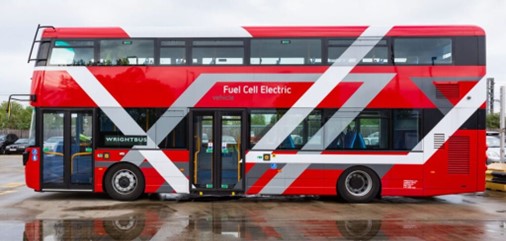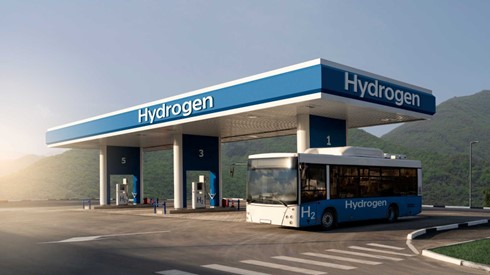- Country: Ireland
- Sector: Buses
- Area of Action: Intercity
- Type of service: Private initiative
- Power source: Hidrogen
- Aspects described in the case study:
- Technical features of e-buses and actual developments
- Charging infrastructure construction and operation
- Digital solutions assisting the use and operation of e-buses
- Training of e-bus drivers
- Training of e-bus maintenance staff
- Eco driving
- Health and business environment of e-bus driving
CONTEXT
The Wrightbus hydrogen bus project focuses on the implementation and operation of hydrogen fuel cell buses, standing out as an exemplary practice in the transition to sustainable public transportation. These buses are designed to offer emission-free urban transportation solutions, especially in medium to large urban areas that seek to improve air quality and meet environmental goals. According to official data, each hydrogen bus can eliminate approximately 75 tons of CO2 per year compared to a standard diesel bus.

THE PROCESS
- Planning and Investment: Wrightbus has initiated its hydrogen bus project with meticulous planning that includes assessing local needs and identifying adequate funding for bus procurement and infrastructure development. This initial phase has required significant investment in research and development to ensure the technical and economic feasibility of the transition.
- Infrastructure Development: In collaboration with local authorities and energy providers, Wrightbus has led the development of a hydrogen refuelling infrastructure network. This critical step has involved the strategic siting of refuelling stations to ensure the continuous and efficient operation of hydrogen buses in urban areas.
- Technology Integration: The company has implemented advanced hydrogen fuel cell technologies in its buses, ensuring that these vehicles meet zero emission standards and offering a viable alternative to conventional diesel buses.
- Training Programs: Comprehensive training programs have been established for technical and operational personnel involved in the operation and maintenance of hydrogen buses. These programs range from safe hydrogen handling to advanced maintenance of fuel cell technology.
- Awareness Campaigns: Wrightbus has launched educational campaigns aimed at both internal staff and the general public. These campaigns seek to increase awareness of the environmental benefits of hydrogen buses, thereby promoting greater acceptance and adoption of clean technologies in public transportation.

IMPACT
- Environmental Benefits: The transition to hydrogen buses has resulted in a significant reduction in local greenhouse gas emissions, contributing directly to improved air quality in densely populated urban areas.
- Operational Efficiency: Hydrogen buses are not only cleaner, but also offer quieter and more efficient operation compared to diesel buses, thus improving the transportation experience for users and reducing ambient noise.
- Public Health: The reduction of air pollutants from hydrogen buses has a positive impact on public health, reducing the risks associated with exposure to harmful particulate matter and other air pollutants.
- Economic Growth: The implementation of clean technologies such as hydrogen buses can also stimulate local economic growth, creating employment opportunities in emerging sectors of renewable energy and technological innovation.
- Training and Skills Development: The training programs implemented have not only improved the technical competence of the personnel involved, but have also fostered skills development in clean technologies, preparing workers for future innovations and sustainable projects in the transportation sector.
MORE INFORMATION
To learn more about the Wrightbus hydrogen bus project, it is crucial to highlight the role of supportive regional and national policies that have facilitated the transition to clean transportation technologies. Despite challenges such as the need for more extensive hydrogen infrastructure and high upfront costs for both vehicles and refuelling stations, continued innovation and commitment to sustainability are paving the way toward greener public transportation. Collaboration between the public and private sectors is critical to the successful implementation of clean infrastructure and technologies in urban transportation.
MULTIMEDIA
Source:
Videos:
mySMARTLife YouTube channel: https://www.youtube.com/@mysmartlifeeu1352
Relevant links:
